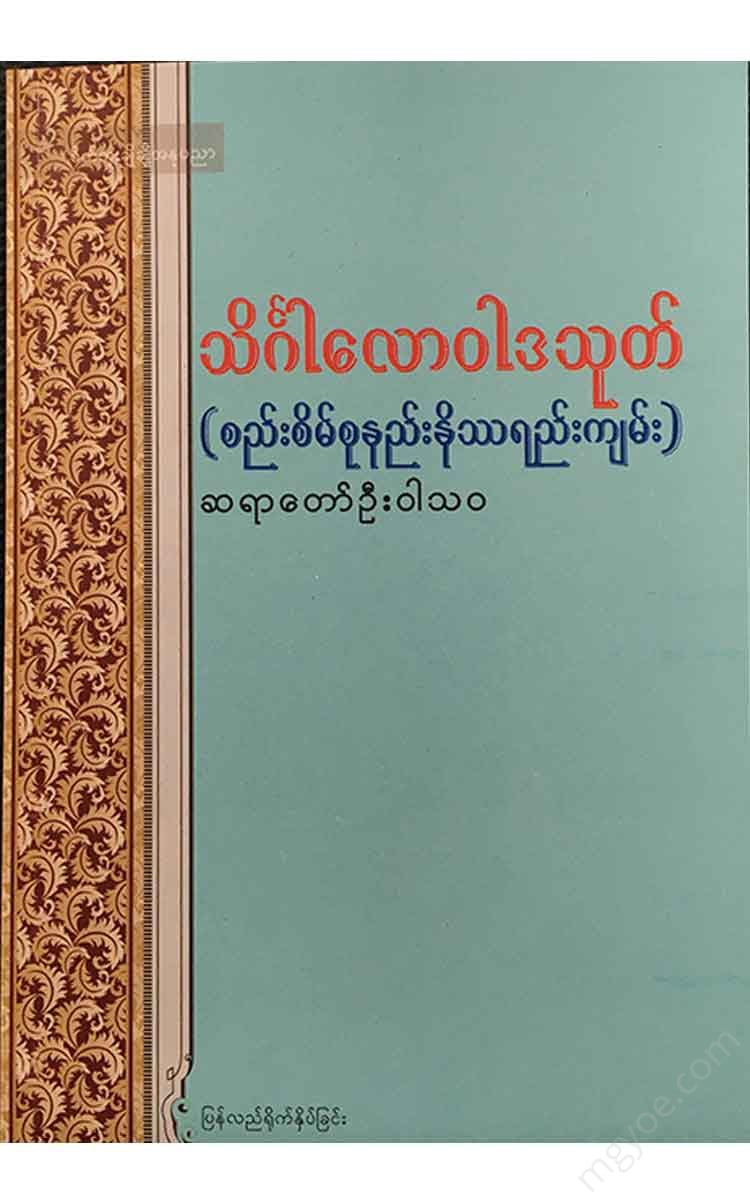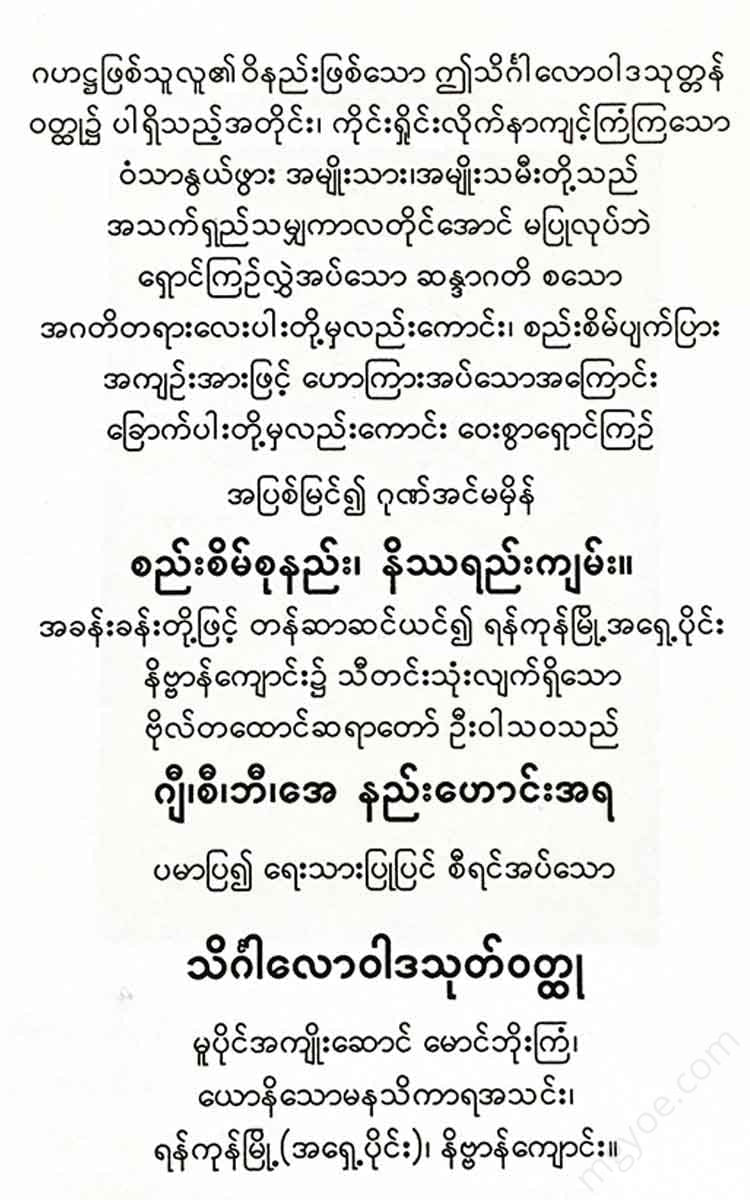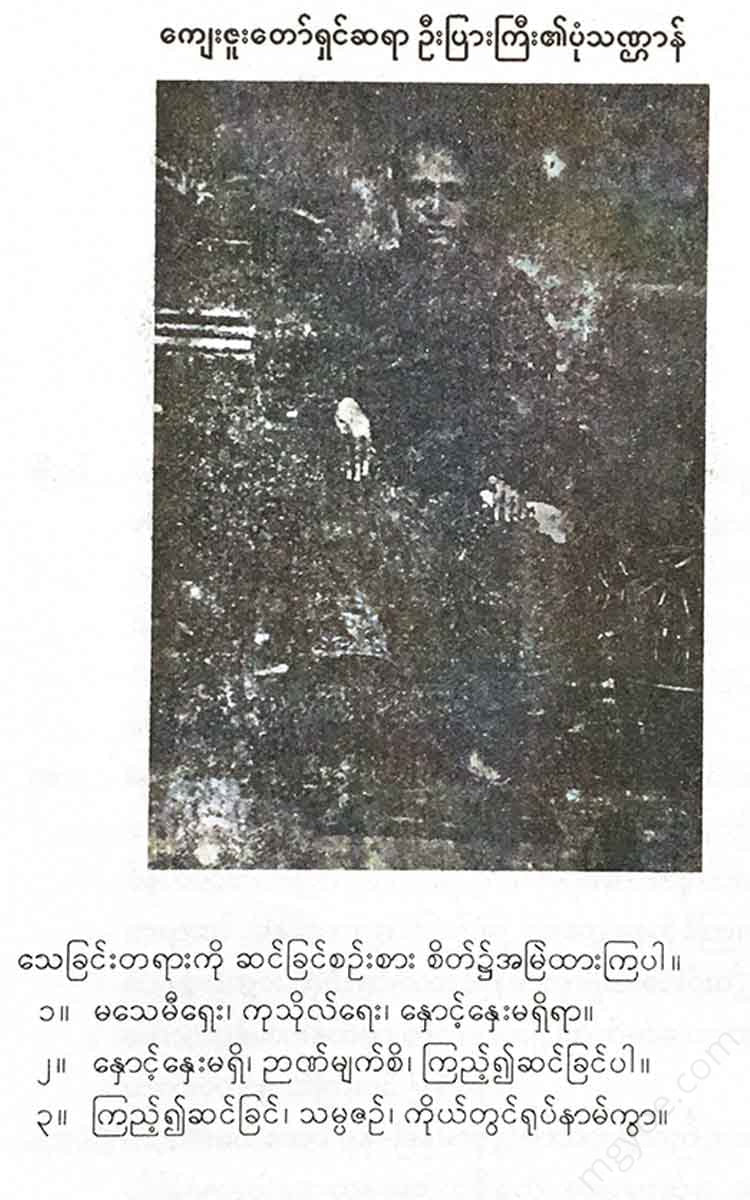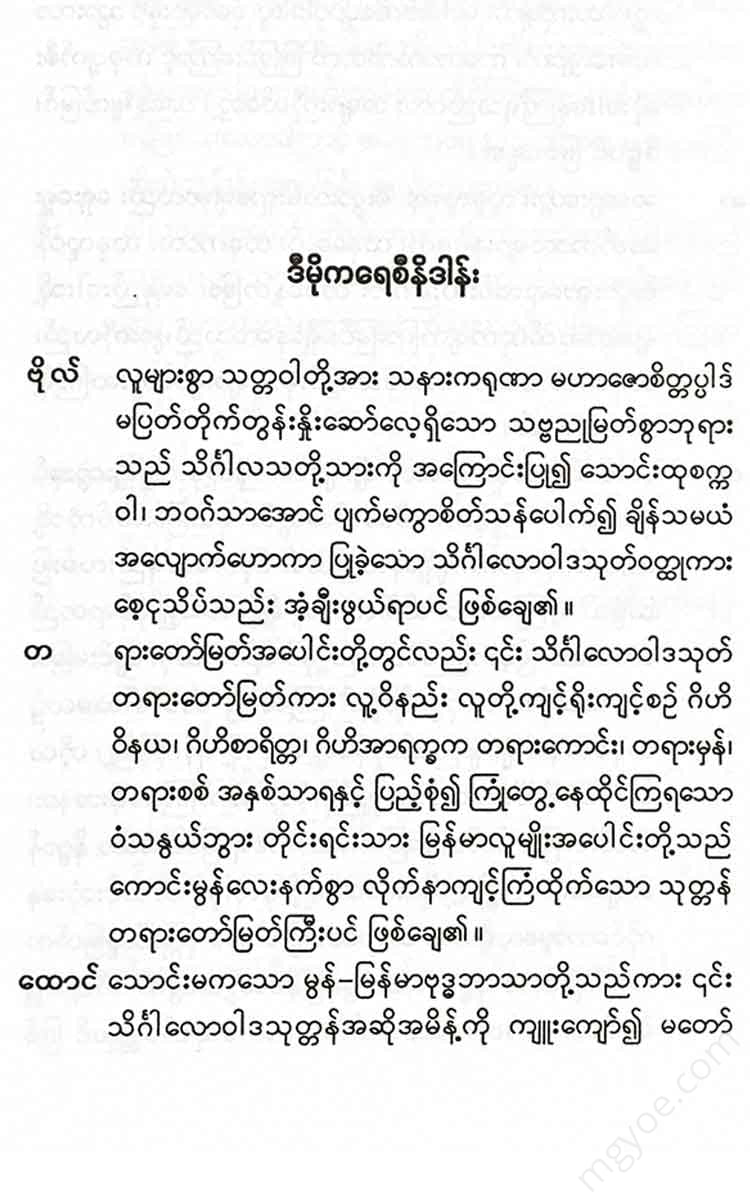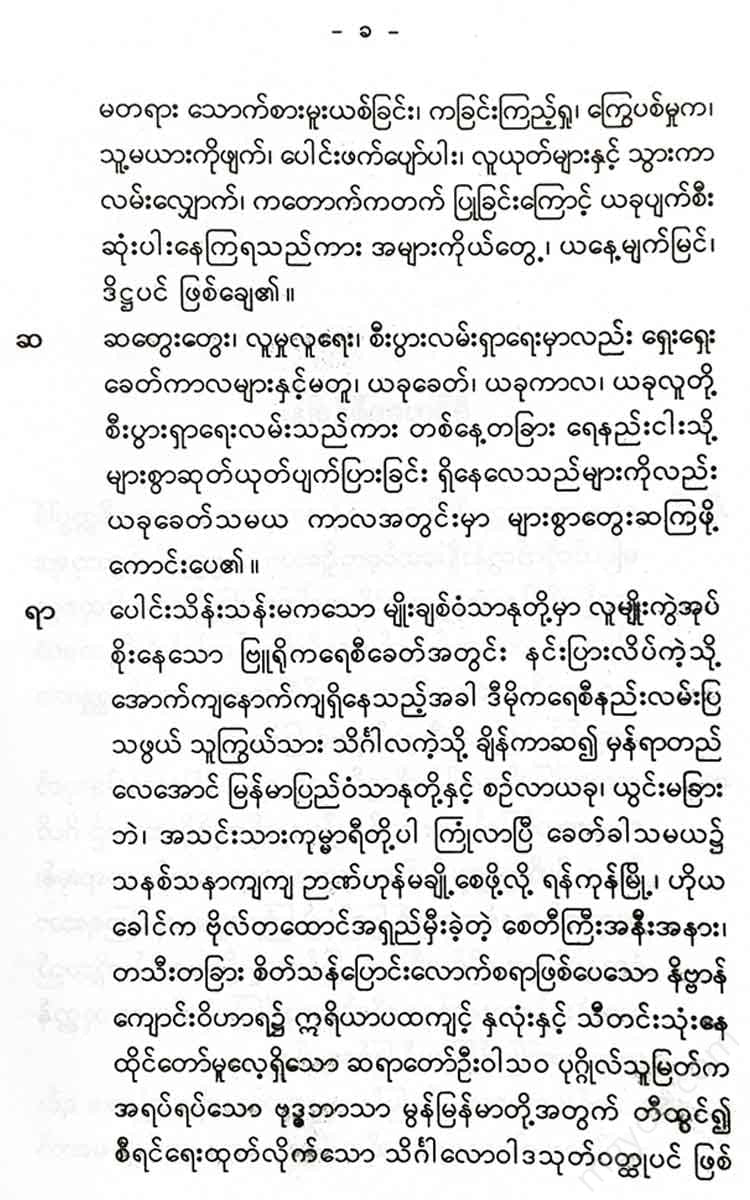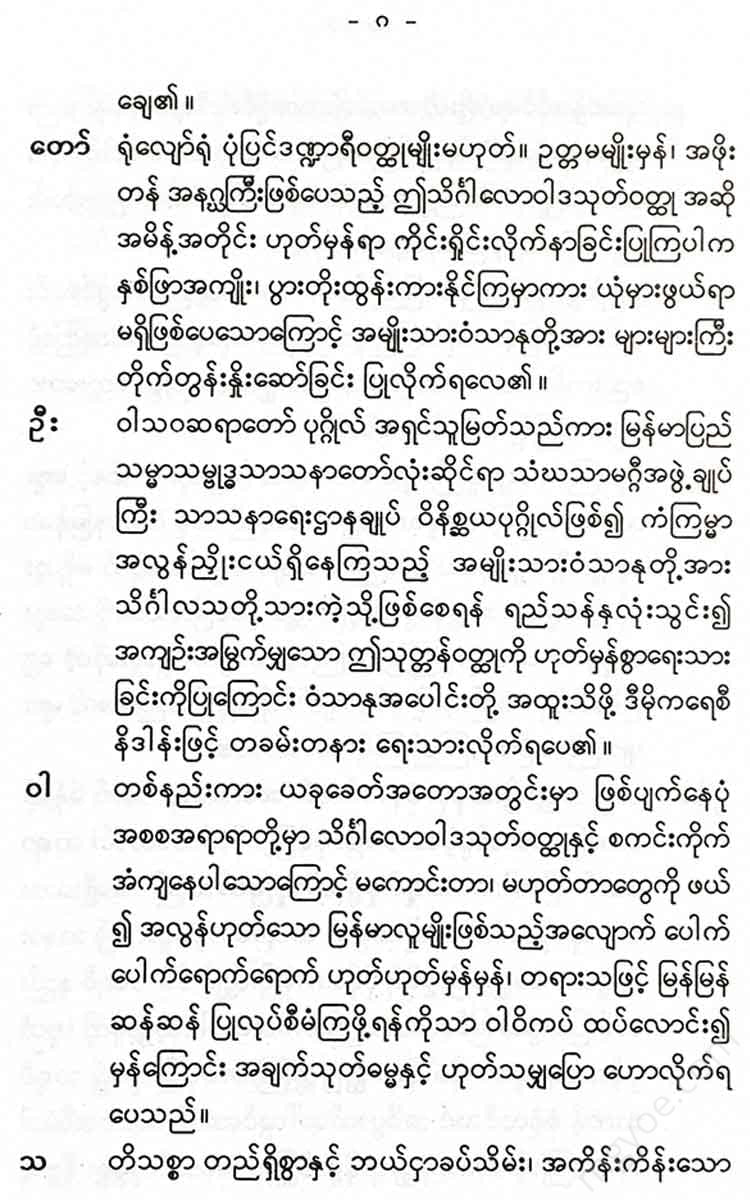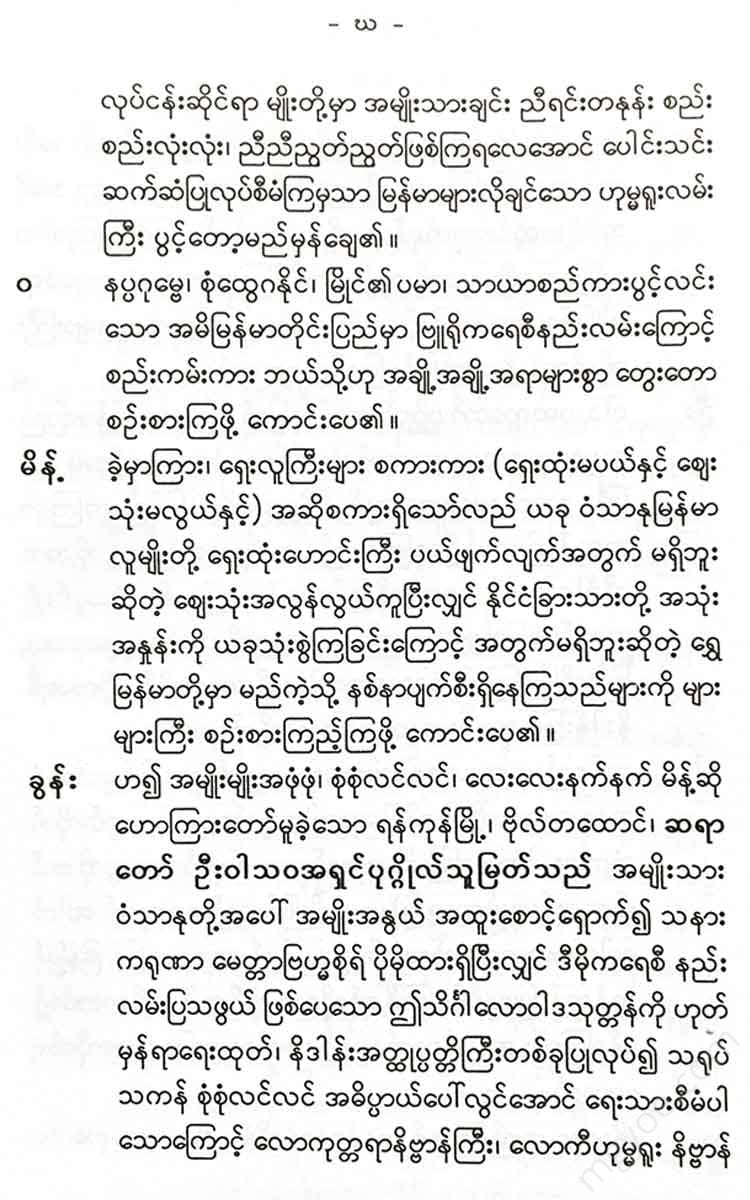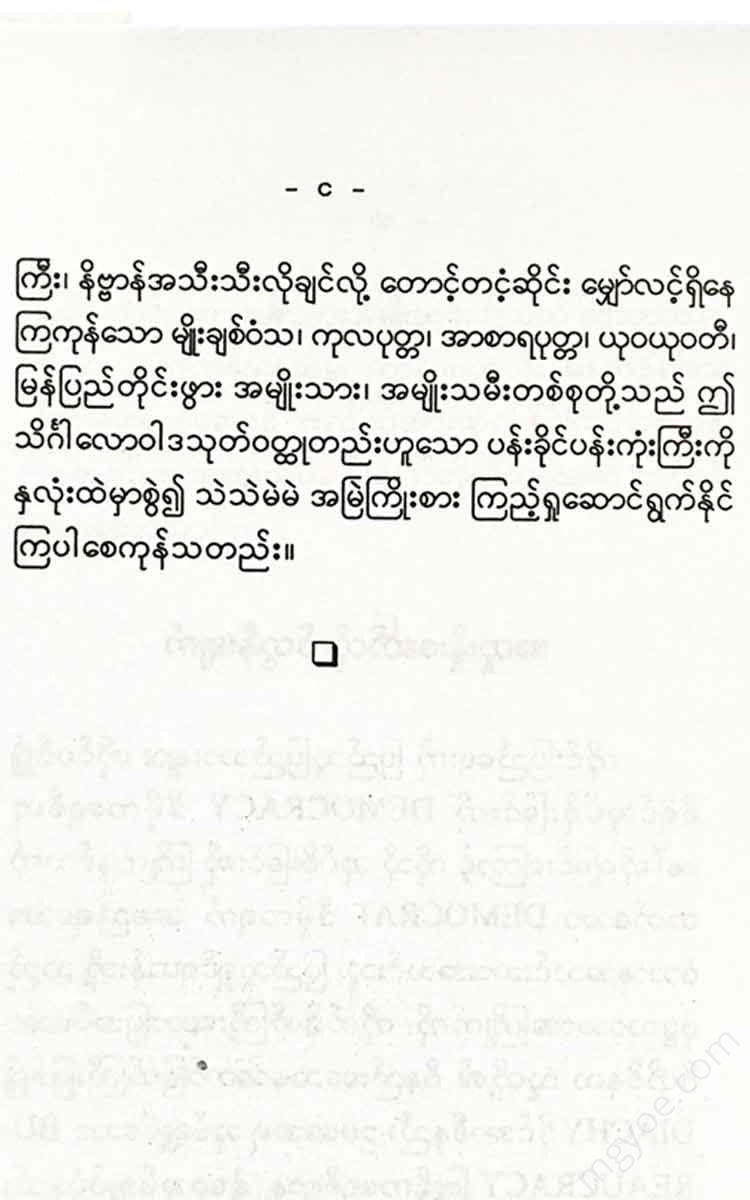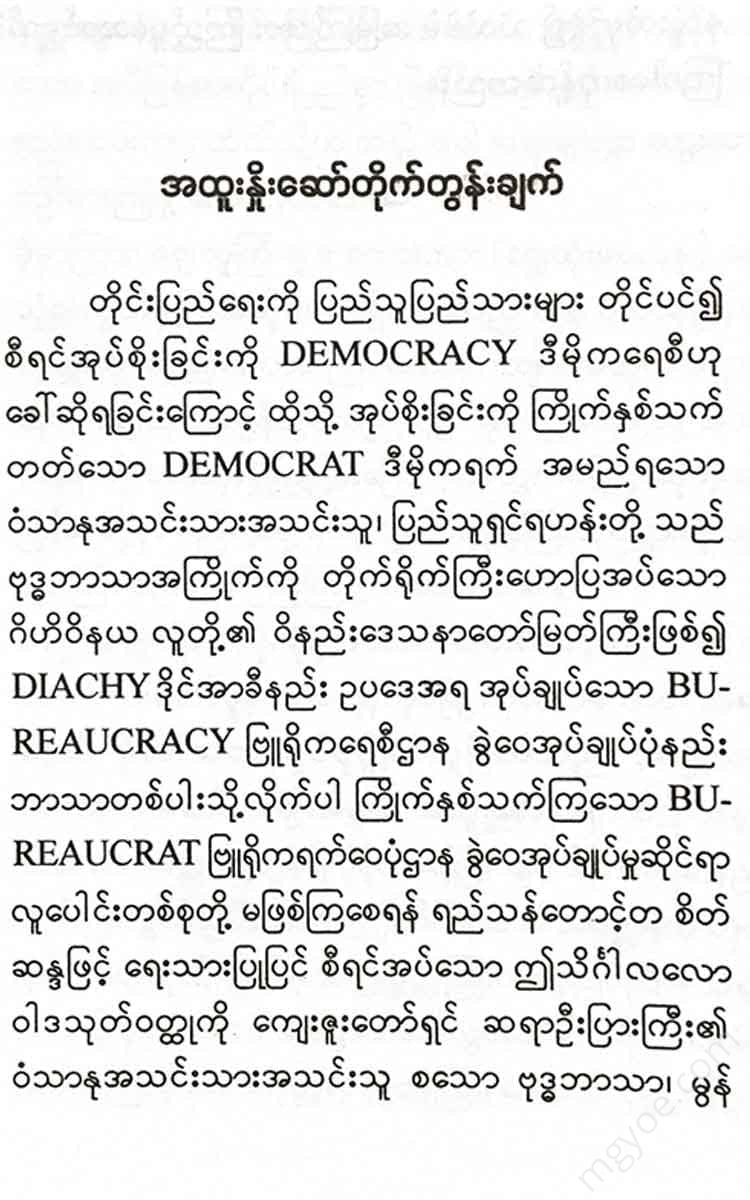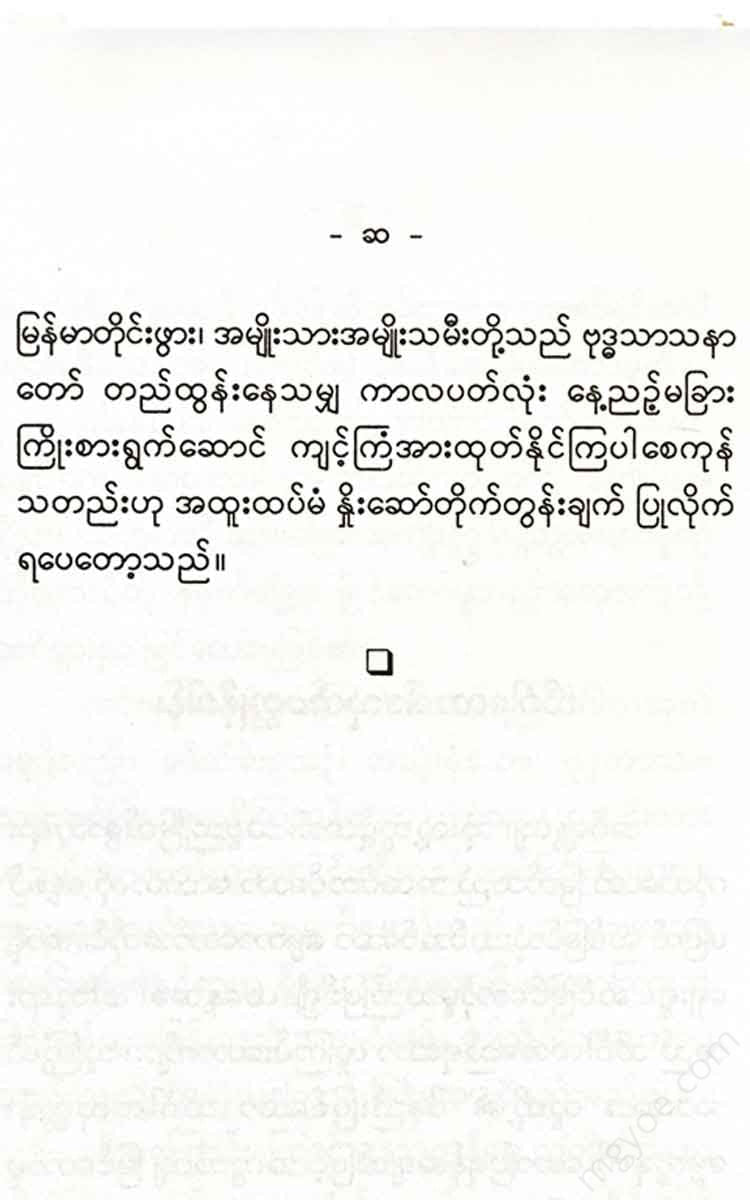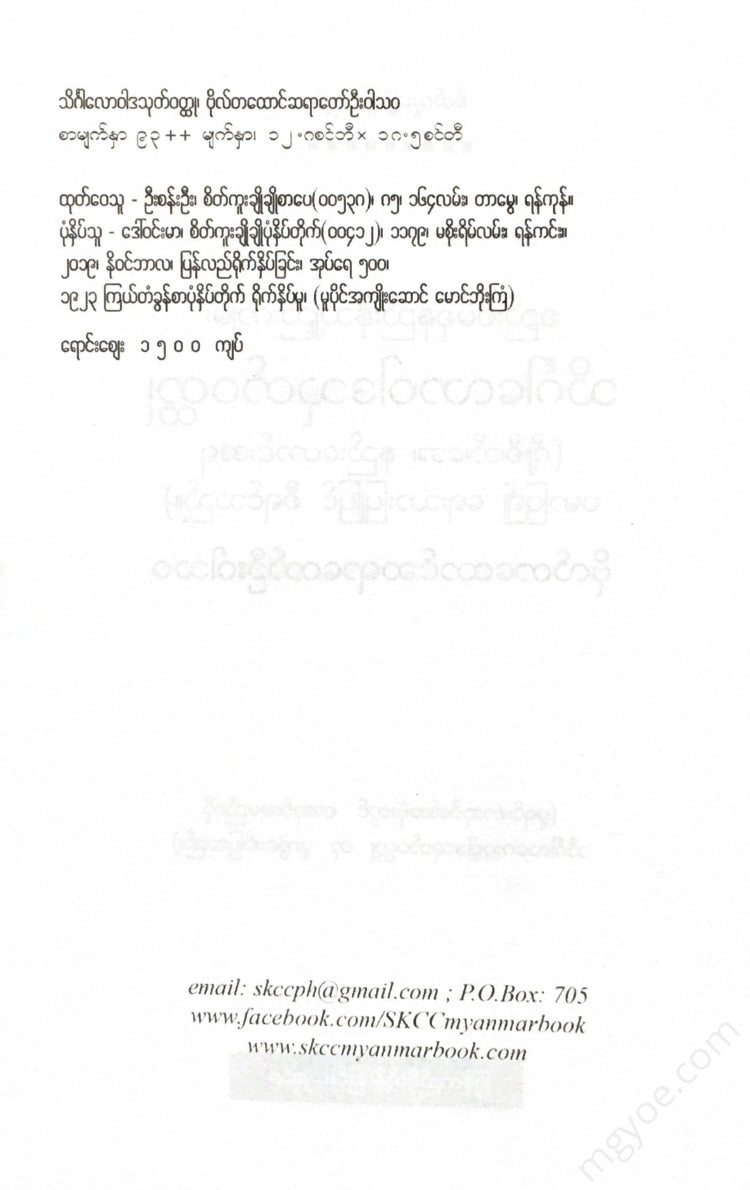စိတ်ကူးချိုချိုစာပေ
Sayadaw Uwathava - Singhalavada Sutta (The Book of the Principles of Wealth)
Sayadaw Uwathava - Singhalavada Sutta (The Book of the Principles of Wealth)
Couldn't load pickup availability
Introduction to the Sinhala Sutta
O Lord, the Supreme Being, the Supreme Being, who daily contemplates and contemplates the world of rebirth, according to the Dhamma that must be contemplated, and today I, the Buddha, have seen a vision of a man named Singhala, a wealthy man, with the intention of expounding the Dhamma, the Singala Sutta, the Dhamma, which is the way of the people.
This Dhamma is of immense benefit to all people, thousands upon thousands, to countless young men and women, to distinguished brothers and sisters, to the laypeople, to monks and nuns, to the whole world
Without delay, he himself went to the place where this wealthy man named Singhala was, and, in accordance with the repeated instructions, he looked forward to the occasion with a clear vision.
For these two reasons, early in the morning, having meditated outside the monastery, he went into the interior of the Rajagaha region to receive alms, and when he saw the young man again, he saw him clearly as if he had seen him in the morning.
From this, again, in this Singala Sutta Dhamma, all things are perfect, all things are complete, all things are pure
For this reason, all those who hear and remember the teachings of this Sutta, the Dhamma, and practice it diligently, without ceasing to do so, may see with their own eyes the good and the bad, the long and the short of life, and all the good and the bad that occur at any given time.
Only the path of
Therefore, in this era and in the Wansanu community, let us also be determined to be free from suffering according to the system of direct self-control, and let us practice this Vinaya devoutly, and let us follow the teachings of the venerable monks who are the members of the President's Order, the Baymyay Sayadaw and the Athit Sayadaw, who are overseen by the venerable monks.
Sayadaw U Wasawa,
Botahtaung, Yangon.
The beginning of the book
Namo-tassa, the forest of the Bhagavad Gita, the forest of the Arahant, the True Buddha.
The cloth is removed and the cloth is removed.
Yathavalamlidiyami, Singalawada Sutta.
(Vatta Gatha)
The sunāṇāṭhādāva, the ṛṣṇṭhā (Gāṭhāddha)
(Black car)
The three jewels, the beginning of the Buddha, the middle of the Dhamma, and the end of the Sangha, are all called Aham, the thousand-strong Sayadaw. (The method of analyzing and interpreting the great five-fold Dhamma, according to the eight-chapter commentary, according to the great commentators) In other words: Aham. Burma, the True Buddhist Religion
On behalf of the Great Sangha Samadhi Association of the World. I, the Venerable Sayadaw of the Eastern Nibbana Monastery in Yangon, who is a great Vinicya person, (according to the method of the great commentators, such as Manideepa, and all the great commentators) bow down to the Buddha, raising my body, my head, my hands, and my head, and bowing down to the Buddha. Having bowed down, I bow down to the Buddha, In order to increase the wealth of the kingdom and the people, and to benefit the people, the Yanthingagalawada Sutta, which is a story about the son of the wealthy Singhalaka, is a good example of a good way to teach, and a good lesson. Aham, the venerable, respected, patriotic person, the venerable one, the true Balam, the Pali Atthakatha commentary, and the modern Homeric camp, as much as the power of the president's lineage, the country, the politics, and all the laws. Lissamy, without pursuing the four evils, I will write everything in a true and natural way. That, the great story of the Singhalaka Sutta that the eastern Yangon monk Botahtaung Sayadaw revealed. Sadhawa, the patriotic Wansanu and the Kumari community members, who are good people, All men and women, good people, always, day and night, always, in their hearts. In other words, the Singalovada Sutta, which was written by the Botahaung Sayadaw, is the true Dhamma of society, marriage and livelihood, the rules of the household, the conduct of the household, and the conduct of the household, and is truly the Dhamma. In their hearts, they are deeply, deeply, and always, truly. Sunata, listen to it with joy and delight, and memorize it well. In other words, Sunata, may all the good people, born in the village of Sayadaw U Bya, listen to it with joy and delight, and memorize it well. This is the beginning of the book.
Sinhala language essay
Once upon a time, the Blessed One, whose name was (the Blessed One), was dwelling in the Veluvana Garden, a place where black squirrels were fed, not far from the land of Rajagaha.
The Pali words (Evam-me-sutta) are the words that Venerable Ananda used when he convened the First Sangha. The phrase (Bhagava) is to be expanded and recorded in the manner described in the Visuddhimagga, Samantapasa-dika, Vinayaka-atthakatha, etc.
(In the Pali text, Rajagaha is the Burmese name for a city in the country, and because that place was guarded and lived by King Mankutta, King Mahagovinda, etc., it is called Rajagaha in Burmese. That place was a forest and a mountain, and was the abode of demons, during the time when the Buddha was born, and during the time when he was King Sakvathi, and during the rest of the time of the city. It should be considered that the Buddha made that place an alms village, and sat, lay, and stood there, and meditated with the four limbs of the Buddha.)
(Veluvane) is the Burmese name for that garden in Pali, and it is surrounded by bamboo huts, surrounded by an eighteen-foot wall, surrounded by a pavilion of tansang and sard, and has a greenish-brown color, and is pleasing to the heart. For these five reasons, it is called the Bamboo Garden. And that is not all. In this bamboo garden, black squirrels are given a place to eat. Therefore, it is called (Kalandakaniwa Pe) in Pali.
( I will show you the eighth sentence of the Athakatha .)
(Long ago, a famous king came to that garden for the purpose of entertainment, and due to the intoxicating liquor, he fell asleep during the day. The king's entourage, the generals, also thought that our lord had fallen asleep, and the flowers and fruits, as if they had been lured and led astray, wandered here and there, their minds wandering. At that moment, a cobra named Katsapa came out of the trunk of a tree, which was not marked by the smell of the liquor, and came towards the king. The tree-keeper, Rukkhasoe, seeing the cobra, thought that he would give the king the power of life, and he created himself in the form of a black squirrel, and approached it and made a sound in its ear. The king woke up at that sound, and the cobra sank back. That king Seeing the cobra, he decided with a clear mind that this black squirrel had given him life, and he made a place for the black squirrels to eat there. He also made them shout so that they would not be harmed. Because of these three reasons, from that time on, that garden came to be called (Kalandaka Nivāpa). That statement is well-founded. The name (Kalandaka) is considered to be the name of the black squirrels. The rest of the story is as follows.
(The expressions in this box are considered to be the middle meaning of the text, not the narrow meaning. They should be considered as such.)
( Biography of the Sinhalese bridegroom)
When the Blessed One was visiting the Rajagaha region, he was staying in the Veluvana garden, a safe place for feeding the black rhinoceros. At that time, a wealthy man named Singhalaka, a resident of Rajagaha, was present. (Gahapatissapatta, Gahapatissapatta, Huvigaha, Gahapatissapatta, the wealthy man. Putta, the son of the wealthy man, was named Singhalaka. Gahapatissapatta, the son of the wealthy man, was named Singhalaka. This is the meaning of the verse.)
The father of the son-in-law of that Sangalaka was a wealthy man with many treasures and was famous in the celestial world. In that wealthy man's house were stored and buried forty crores of wealth. That wealthy man believed in the Blessed One.
By appreciation, one reaches a decision. Only the Sotāpana who is devoted to the three jewels, and the householder of that wealthy person is also only the Sotāpana. (The inclusion of this Sutta in the four Sutta Nikkhepa, namely, the Attā jjāsaya, the Prajjāsaya, the Attā kapatika, and the Pussavasika, is stated in the Attākatha to show that it is the Attāpapatika.)
The son, Singhalaka, had no faith, no devotion, no reverence for the three jewels. Therefore, his mother and father gave him a son named Singhalaka.
If the benefactors continue to repeat this, they will rebuke you in the way that you would say when the time comes to rebuke you.
( Parents' advice to the groom in Sinhala)
My dear son, the elder Singalaka, go to the Buddha, the teacher of gods and men, the True Buddha. Go to the venerable Sariputta, the great judge of the Dhamma, and to the venerable Moggallana, and to the venerable Mahakassapa, and to the eighty great disciples. They all spoke as I had said. My son Singalaka refused to resist, saying, "I have no business approaching your monks. I will go to the monks and pay homage. The back of one who bows and pays homage becomes sore. The knees of one who bows and pays homage become stiff. I will live on the ground. The clothes of one who lives on the ground become dirty and decay. I will sit near the monks and talk to them.
The speech will be made. When that speech is made, the acquaintance will be made. Because of such acquaintance, the merchant will be invited and given the four things, such as robes and alms. When the merchant gives the four things in this way, the profits and wealth will be exhausted.
It will decrease. He refused to approach the monk who was worshipped by his mother and father, and said, "There is no such thing as approaching a monk who is worshipped by his mother and father." Although he was repeatedly advised in this way, he refused, and so, despite his long life, Singhalaka advised the groom, but his mother and father were unable to teach him the eight wonders of the Buddha's religion. Since they were unable to do so, the groom's father, who was lying on his deathbed, thought, "It is fitting that my son should be given the final instruction and instruction," and the idea came to him again.
(Disa tata namasthahi) My dear son... Singala, the son of the bridegroom, pay homage to the directions. I will give this advice to my son. That son, without understanding the meaning, will pay homage to the directions that ordinary people call them. At that moment, the Blessed One and his disciples will see my foolish son and ask him, "What have you done?" Because of this question, my father will give me the advice (disanamasthana karohi) to pay homage to the directions. He will say this. At that time, the Buddhas and the disciples of the Buddha who see my son, your father will not actually pay homage to these directions. He will definitely pay homage to these directions. Having said this, he will guide my son to the right path. My son will have the eight wonders, The Buddha, knowing with his eyes of wisdom that the Buddha is the most worthy of praise, does not neglect good deeds. He will always do them with certainty. This was his intention. At that time, he called his son, Singhala, and his beloved son Singhala had already said this, "Get up from your bed and pay homage to the directions." Whatever words a person utters on the verge of death should be remembered throughout his life. Therefore, the son of the wealthy man, who was a recluse, carefully considered what his father had said and did as his father had said. Therefore, the words (Kālasava utthāya rajagaha nikkhamītva) are stated in the Pāli.
The son of that wealthy man named Singala, wishing to do as his father had said, got up early in the morning, put on a wet cloth, spread out his wet hair, and, with folded hands, set out from the land of Rajagaha, and bowed to the east, the south, the west, the north, the south, the north, the south, and the north above, in this way he bowed to the six directions, which were very different and very different. While he was bowing to them, the Blessed One, endowed with the six glories and infinite attributes, in the morning took his robe, put on his robe, took his bowl, and set out for the land of Rajagaha to receive alms. At that moment, the Blessed One saw a wealthy man named Singhalaka, who had risen early in the morning, had left Rajagaha, was wearing a wet robe, had spread his wet hair, and was bowing to the east and the six directions with folded hands. He was still looking and seeing. He was not just looking and seeing when he was entering. Indeed, in the morning, when he was getting up, he was also aware of the presence of the asaya, the nusaya, the With the Buddha's eye, the knowledge of the Indiya, he contemplated the three worlds, and saw this wealthy man named Singala, who was bowing down to the six directions in various directions. He said, "This morning, I will teach this cruel wealthy man the Vinaya of the people, the Vinaya Sutta Dhamma." The Vinaya, which he will preach to a large audience of thousands of people, will be like a flood of good and prosperity. He thought, "I myself will go to the place where this cruel wealthy man named Singala is." With a clear mind, he set out early in the morning.
He went to the Rajagaha region to receive alms. While he was going and going, he saw the wealthy man named Singhala, and when he woke up at dawn, he saw him again. For these two reasons, the phrase "Adda Sabe Bhagava" is mentioned in the Pali text.
( The Buddha's question to the groom of Sinhala)
Having thus considered, he spoke as he would have asked the son of a rich man named Singhalaka. The rich man's son Singhalaka said, "What is your business? You have risen early in the morning and come out of the Rajagaha country. With wet clothes and wet hair, you have raised your hands and walked in the six directions, east, south, west, north, below, and above."
